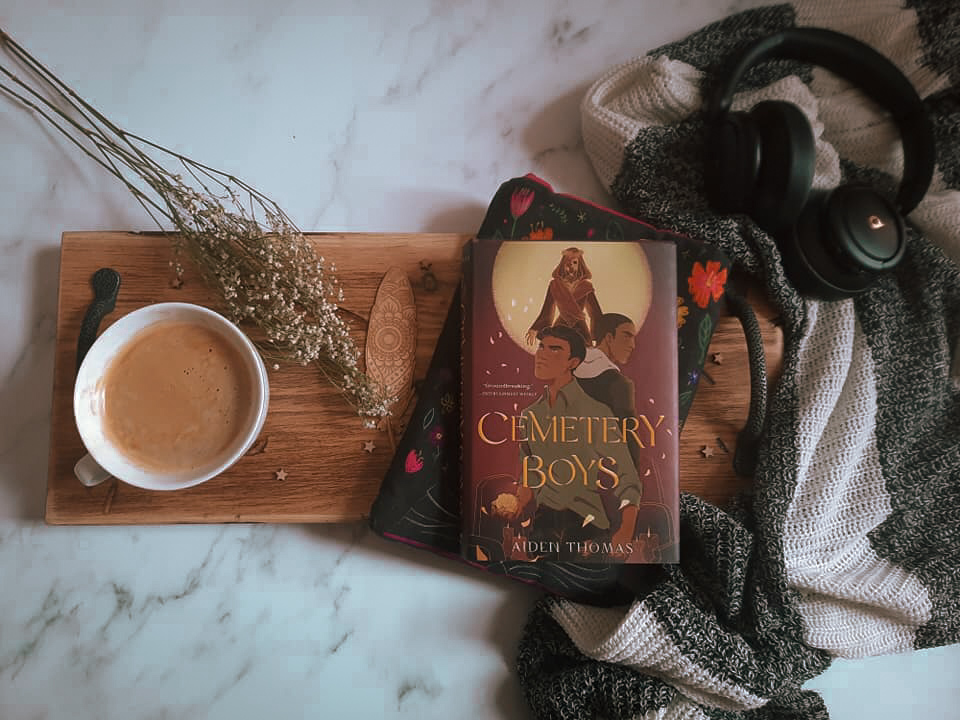Kelly Beestone
Yadriel groaned and dragged a hand over his face. On the bright side, he had actually summoned a real-life spirit. On the not-so-bright side, he had summoned the wrong one.
Thomas 50-51
When I first heard rumblings in the YA community about Cemetery Boys in August 2020, I immediately started getting excited. Who doesn’t love a book about ghosts, especially if it releases around Halloween time? Plus, there’s not many YA novels with trans protagonists, especially in the fantasy genre, so it was very refreshing to see an Own Voices book like this.
Cemetery Boys deserves all the hype. Thomas’ debut does a brilliant job of exploring trans identity, through the lens of a Latinx, brujx culture. Inspired by Thomas’ own desire to see elements of their own identity reflected in media, the narrative follows Yadriel, a trans boy who raises a ghost to prove his gender to his traditional brujx family. The brujx are responsible for maintaining the balance of life and death, and the roles are heavily gendered with women brujas using healing magic and the brujo men finding and releasing spirits. Yadriel tries to summon the spirit of his dead cousin, Miguel, to help the brujx locate his body and find out how he died. Except Yadriel accidentally summons the ghost of Julian, a bad-boy at his high school. When Julian refuses to leave, Yadriel’s life gets much more complicated, especially because he can’t help his growing feelings for the ghost he’s trying to get rid of.
As an urban fantasy novel set in L.A. the novel balances fantasy and the snapshots of teen life we have come to expect in YA as well. It was funny getting to see the characters sneaking around concerned parents; especially since it captured that teen experience of rebellion and subverted the well-established YA trope of orphans and absent parents. It was nice to see parents caring about their children and their safety and I felt it was representative of a lot of teen experiences, even if people usually don’t sneak out to talk to ghosts! There’s also a fascinating atmosphere to the novel, created by the setting and brujx culture. Thomas maintains that the world is “intrinsically related to Día de Muertos” and that the magic in Cemetery Boys takes the beliefs celebrated during the Day of the Dead and the magic around the celebration and transforms it into “literal magic” (Thomas interviewed by Burt). Thomas does a masterful job of relaying information to the reader, weaving in facts in ways which never tip too far into “telling” or info-dumps.
There’s also a fierce feeling of joy shining through the pages. It’s clear Thomas thoroughly enjoyed bringing to life a book that explores Latinx culture. And although the novel deals with some pretty significant issues, such as death and grief, Cemetery Boys has a light-hearted tone that makes it less dark than it could have been.
The approach to Latinx culture is handled delicately. Thomas’ decision to incorporate different Latinx cultures into the novel was an important and inclusive choice. The novel brings attention to a mixture of communities through the Mesoamerican brujx families, with traditions hailing from Mexico, Cuba, Haiti, and Columbia, to name a few. I felt like this added a lot of nuance and depth to the story, while still bringing the characters together through things they have in common.
I found the use of Spanish very accessible, too. There’s been some discussion in recent years about the use of different languages in texts published in English, and whether offering a translation alongside the word enables accessibility, or if it may alienate readers who speak those languages (there’s a really great Twitter thread by Mexican-Canadian author Silvia Moreno-Garcia outlining this debate and defending her use of Spanish). Cemetery Boys deals with this issue with tact. While there is no glossary or accompanying English translation for the Spanish dialogue and inner-monologues, the actions that accompany this dialogue offer non-Spanish speaking readers some context. Similarly, Thomas describes foods like concha and takis in ways that are still accessible to all readers, regardless of language barriers. There’s a few phrases I used Google translate for, such as one important phrase uttered by Julian towards the end of the novel. Given the emotional intimacy of his speech, I liked how it was delivered in Spanish, since it offered the character a layer of privacy in this moment and celebrated the language. Spanish is also a gendered language, which adds complexity to the conversation about trans identities at the heart of Cemetery Boys and the brujx roles within the community.
The binarity of these roles and the gender-affirming magic system cause a lot of conflict throughout the novel, particularly amongst Yadriel’s immediate family. Yadriel’s motive is to prove he’s a brujo, but his family keep delaying his chance to show the community he’s capable of brujo magic. I liked that Thomas shows a lot of Yadriel’s frustrations at dealing with his family’s confusion and occasional slip-ups, while maintaining that clear familial love. All too often, narratives surrounding trans characters depict families acting in polarising ways—either by immediately accepting their child and their identity, or by rejecting them. Cemetery Boys depicts something less extreme—a family attempting, and struggling, to understand queerness. What happens after an LGBTQ+ individual comes out, and the process of having to deal with family and friends who are processing this information, is an area that is still relatively unexplored in YA. It’s great that the novel chooses to dig into this and show the journey towards understanding that Yadriel and his family go through in Cemetery Boys.
Overall, Cemetery Boys was a thrilling read, which expertly blended real-world issues with horror and humour. I think readers will find it compelling and nuanced, and will empathise with Yadriel, regardless of how they identify. I highly recommend it!
References
Burt, Kayti. ‘Cemetery Boys: A Conversation with YA Author Aiden Thomas’. Den of Geek, 10 Aug. 2020, https://www.denofgeek.com/books/cemetery-boys-aiden-thomas-interview/.
Moreno-Garcia, Silvia. ‘I Try Not to Use Words in Spanish as Much as Possible & Then I Get Reviews Saying the Book Is Not Mexican Enough Because It Didn’t Have Enough Words in Spanish. One Time I Wrote Eggs Rancheros Because It’s What Was Used in the Menu Here & Got a Letter about It. Impossible to Win.’ @silviamg, 26 Dec. 2020, https://twitter.com/silviamg/status/1342951766069923841.

Cemetery Boys (Aiden Thomas)
Swoon Reads
ISBN: 978-1250250469
352 pages, Ages 14-18
Publication date: 1st October 2020
Did you know “Cemetery Boys” was the YASA Book Club read for January 2021? The Club’s next meeting is on 25th March at 8pm GMT. This month, we’re reading YASA President Leah Phillips’ pick, “A Song of Wraiths and Ruin“ by Roseanne A. Brown.
For more details, see our members-only Slack.
Not yet a member? Join now for free.
